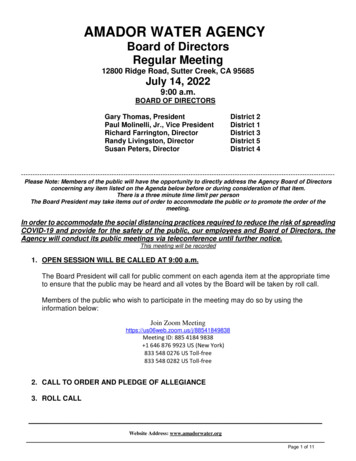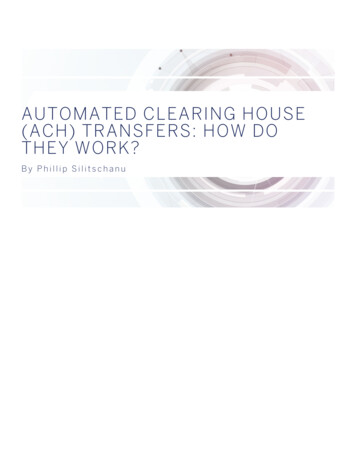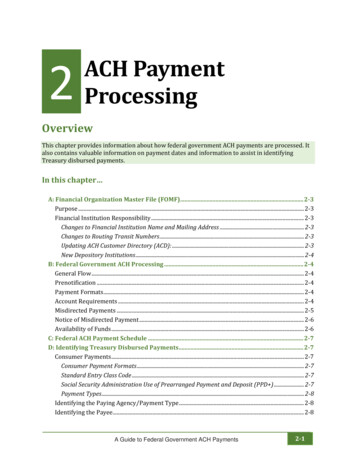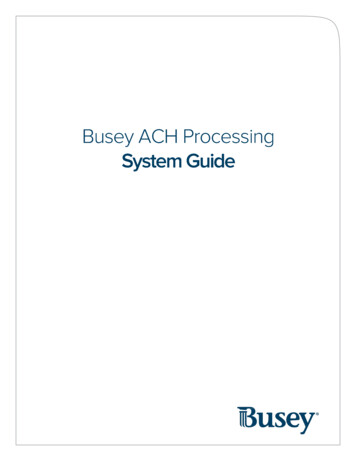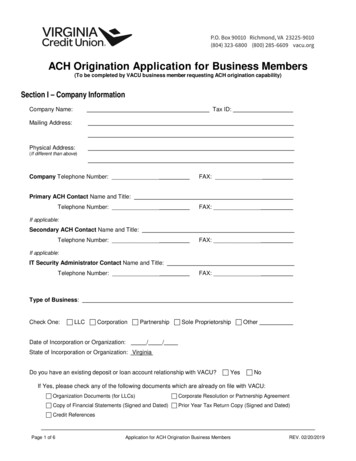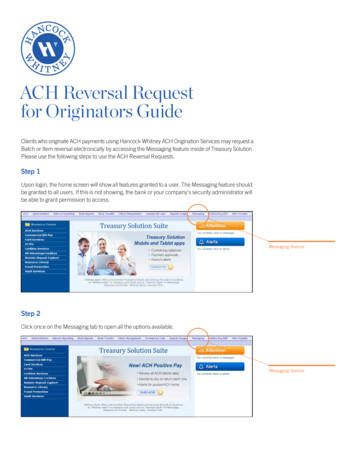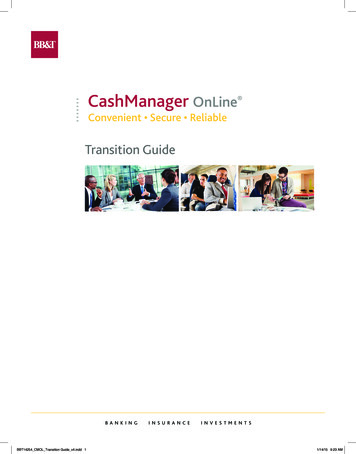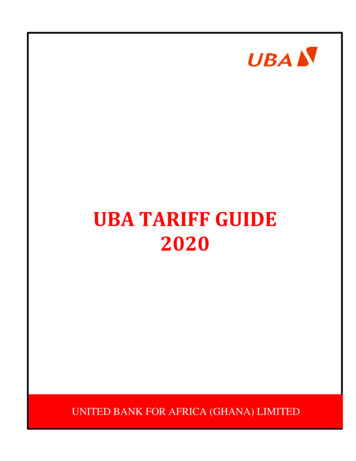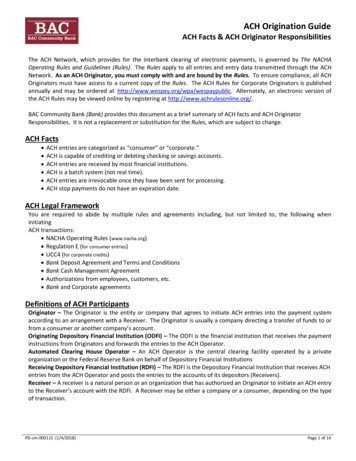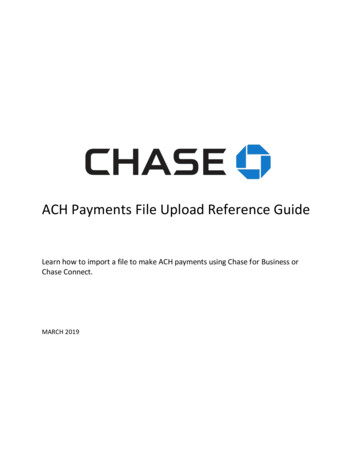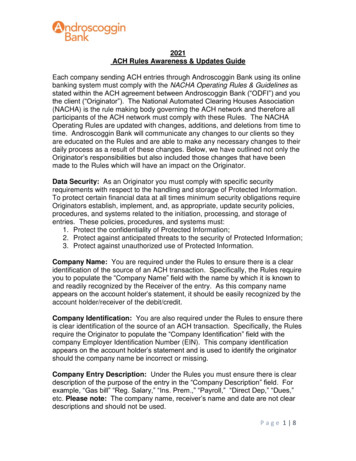
Transcription
2021ACH Rules Awareness & Updates GuideEach company sending ACH entries through Androscoggin Bank using its onlinebanking system must comply with the NACHA Operating Rules & Guidelines asstated within the ACH agreement between Androscoggin Bank (“ODFI”) and youthe client (“Originator”). The National Automated Clearing Houses Association(NACHA) is the rule making body governing the ACH network and therefore allparticipants of the ACH network must comply with these Rules. The NACHAOperating Rules are updated with changes, additions, and deletions from time totime. Androscoggin Bank will communicate any changes to our clients so theyare educated on the Rules and are able to make any necessary changes to theirdaily process as a result of these changes. Below, we have outlined not only theOriginator’s responsibilities but also included those changes that have beenmade to the Rules which will have an impact on the Originator.Data Security: As an Originator you must comply with specific securityrequirements with respect to the handling and storage of Protected Information.To protect certain financial data at all times minimum security obligations requireOriginators establish, implement, and, as appropriate, update security policies,procedures, and systems related to the initiation, processing, and storage ofentries. These policies, procedures, and systems must:1. Protect the confidentiality of Protected Information;2. Protect against anticipated threats to the security of Protected Information;3. Protect against unauthorized use of Protected Information.Company Name: You are required under the Rules to ensure there is a clearidentification of the source of an ACH transaction. Specifically, the Rules requireyou to populate the “Company Name” field with the name by which it is known toand readily recognized by the Receiver of the entry. As this company nameappears on the account holder’s statement, it should be easily recognized by theaccount holder/receiver of the debit/credit.Company Identification: You are also required under the Rules to ensure thereis clear identification of the source of an ACH transaction. Specifically, the Rulesrequire the Originator to populate the “Company Identification” field with thecompany Employer Identification Number (EIN). This company identificationappears on the account holder’s statement and is used to identify the originatorshould the company name be incorrect or missing.Company Entry Description: Under the Rules you must ensure there is cleardescription of the purpose of the entry in the “Company Description” field. Forexample, “Gas bill” “Reg. Salary,” “Ins. Prem.,” “Payroll,” “Direct Dep,” “Dues,”etc. Please note: The company name, receiver’s name and date are not cleardescriptions and should not be used.Page 1 8
Authorization Requirements: You must obtain authorization from the Receiverto originate one or more Entries to their account.Authorization Retention: The signed or similarly authenticated authorizationmust be retained by the Originator for a period of two years following thetermination or revocation of the authorization. In the case of a paperauthorization that has been signed by the consumer, the Originator must retaineither the original or the copy of the signed authorization. This authorization maybe obtained in an electronic format that (1) accurately reflects the information inthe record, and (2) is capable of being accurately reproduced for later reference,whether by transmission, printed or otherwise. The Originator must provide theoriginal copy or other accurate record of the receiver’s authorization toAndroscoggin Bank for its use or for the use of a Receiving Depository FinancialInstitution (RDFl) requesting the information. The authorization must be providedin such a time and manner to enable Androscoggin Bank to deliver theauthorization to the RDFl within ten (10) banking days of the RDFl request.Authorization Requirements for Consumer Entries: For consumer entries(those entries hitting a consumer account and not a corporate account).Originators should ensure that the authorization is clear and readilyunderstandable by the account holder/receiver. The authorization should includeaccount number and routing number which should be clearly stated (i.e.) a copyof the account holder’s check stapled to authorization ensures the numbers areclearly obtained), the consumer must date and either sign or similarlyauthenticate (must prove that you had the account holder’s authorization to debitthe account), should include what type of account it is debiting and/or crediting(demand deposit account, savings account), company identification is easilyunderstandable (see below under company identification)., and the Originatormust obtain authorization for both consumer credit and debit entries. Companiesare responsible for ensuring the authorization is “clear and readilyunderstandable” is not considered a valid authorization.Originators need to ensure its authorizations are clear and readilyunderstandable in order to be a valid authorization. A review of its authorizationsshould be performed to make sure it meets the requirements of the NACHAOperating Rules. If the company is unaware if the authorization is clear andreadily understandable, it may contact its account officer for guidance.Authorization Requirements for Corporate Entries: As with consumerentries, the business Receiver must authorize all ACH credits and debits to itsaccount. The Originator must enter into an agreement with each businessReceiver on entries to which the Receiver has agreed to be bound by theNACHA Operating Rules. This agreement for credits and/or debits to thecorporate customer account should be clear to the corporate customer as to whatthe credit/debit represents.Page 2 8
Proper Use of Standard Entry Class (SEC) Code: Androscoggin Bank allowsour Originators to send PPD (Prearranged Payments and Deposits) forconsumers hitting consumer accounts and /or CCD (Corporate Credits andDebits) for corporate hitting corporate accounts. Since the file format requiresonly one SEC code, consumer and corporate transactions are to be in separatebatches with the appropriate SEC code. Consumer transactions are to reflect aconsumer name in the “Individual Name” field and corporate transactions are toreflect the corporate name.Additional Standard Entry Class codes for clients that obtain their authorizationsorally or through web-based channels, may be available upon request contingentupon approval from Androscoggin Bank prior to its use.Notice of Change in Amount/Change in Debiting Date for Recurring Debits:For recurring debits, when the debit amount varies, the Rules require theOriginator to notify the account holder/receiver within ten (10) calendar daysbefore the schedule transfer date. If an Originator changes the date in which itdebits the account holder/receiver, it must notify the account holder/receiver inwriting of the new date of the entry at least seven (7) calendar days before thefirst entry to be affected by this change is scheduled to be debited to theReceiver’s account.Prenotifications: Prenotifications are zero dollar entries generated to validatethe account held at the receiving financial institution. Originators may originate aprenote; however this is not required under the Rules. If the Originator initiated aprenotification, it must wait three (3) banking days prior to initiating the live dollaramount.Notification of Change Requirements: Notifications of Change are zero dollarentries sent by the RDFl to the Originating Depository Financial Institution (OFFI)to alert the Originator that a change to its transaction should be made. Under theNACHA Operating Rules, you are required to change the information (theinformation requested to be change by the RFDI) within 6 banking days of receiptof the NOC or the next time the transaction is generated, whichever is later.Receiving ACH Returns and Reinitiating of Entries: The NACHA OperatingRules make allowances that NSF and Uncollected Funds (Return Reason CodeR01 and RO9) may be reinitiated. Under the NACHA Operating Rules, a returnedentry may not be reinitiated unless (1) the entry has been returned for insufficientor uncollected funds; (2) the entry has been returned for stopped payment andreinitiating has been authorized by the Account Holder, or (3) the bank or theOriginator has taken corrective action to remedy the reason for the return. As acorporate customer, any returns received should be resolved within 180 daysafter the Settlement Date of the original entry, and no reinitiating of the sameentry should be transmitted unless one of the reasons above has occurred.Reinitiation is limited to two times per entry.Page 3 8
An Originator must submit Reinitiated Entries as a separate batch that containsthe word “RETRY PMYT” in the Company Entry Description field of theCompany/Batch Header Record. The Company Name, Company ID, andAmount fields must be identical to the original entry.Correction of Entries: Entries returned because of an invalid effective date orincorrect amount (Return Reason Code R11 – Customer Advises Entry Not inAccordance with the Terms of the Authorization) may correct and transmit a newentry that conforms to the original authorization within 60 days of the Settlementof the Return.Stop Payments Made by Consumer: This affects Originators as a stoppayment may be placed on the RFDI’s system for all future transactions relatingto the Originator. Originators need to train its internal staff to ensure theyunderstand that there may be multiple stop payments returned. These shouldnot be reinitiated into the system until resolved.Reversing an ACH File: An Originator may reverse a file if the file is erroneousor duplicate. The Originator may transmit the reversing file with five (5) bankingdays after the Settlement/Effective Date for the entries within the duplicate orerroneous file. The word “REVERSAL” must be placed in the Company BatchHeader Field and if the file is reversing an erroneous file. The Company ID, SECCode and Amount Fields of the Reversing Entry must be identical to the originalentry. The Originator must initiate a correcting file with the reversing file.Reversing an ACH Entry: An Originator may reverse an entry if the entry iserroneous or a duplicate entry. The Originator may transmit the reversing filewithin five (5) banking days after the Settlement/Effective Date for the entrieswithin the duplicate or erroneous file. The word “REVERSAL” must be placed inthe Company Batch Header Field. Company ID, SEC Code and Amount Fieldsof the Reversing Entry must be identical to the original entry. Only an Originatormay reverse an entry. The Originator should notify the account holder/receiver ofthe reversing entry no later than the Settlement Date of the reversing entry.Erroneous File or Entry: A file or entry that (1) is a duplicate of an entrypreviously initiated by the Originator or ODFI; (2) orders payment to or from aReceiver different than the Receiver intended to be credited or debited by theOriginator; (3) orders payment in an amount different that was intended by theOriginator; or (4) is a PPD credit entry satisfying each of the following criteria: (i)the PPD credit entry is for funds related to a Receiver’s employment; (ii) thevalue of the PPD credit is fully included in the amount of a check delivered to thesame Receiver at or prior to the Receiver’s separation from employment; or (iii)the PPD credit entry was transmitted by the Originator prior to the delivery of thecheck to the Receiver.Page 4 8
Same Day ACH: An Entry in which the Effective Date is the same as the DateTransmitted to the Bank in accordance with Androscoggin Bank’s processingrequirements and SDA cut-off time is considered a Same Day ACH entry. EitherDebit and Credit entries for 100,000 or less may be eligible for Same Dayprocessing. IAT entries are not eligible. The Receiving Financial Institution willmake the funds available for withdrawal to the beneficiary by 5:00PM EST.Third Party Sender Registration: The third-Party Sender Registration Rulerequires every Originating Depository Financial Institution (ODFI) to eitherregister its third-Party Sender customer(s) with NACHA, or provide to NACHA astatement that it has no such customers. To aid ODFI’s in collecting registrationinformation, the Rule obligates Third-Party Senders to provide the ODFI’s, uponrequest, with any registration information needed. Such information may include:(i) any doing-business-as name, taxpayer identification number(s), and street andwebsite address(es); (ii) the name and contact information for the Third-PartySender’s contact person; (iii) names and titles of Third-Party Sender’s principals;(iv) type of entries (debit, credit, or both) transmitted by Third-party Senders.General Audit Requirements for Third-Party Senders: A third- party sender isan intermediary between the bank and the entity’s (Third-Party Sender’s)customers. The Rules require that all Third- Party Senders conduct an internal orexternal audit of its ACH operation and compliance with the Rules no later thanDecember 31 of each year. Documentation supporting the completion of an auditmust be (1) retained for a period of six years from the date of the audit, and (2)provided to NACHA upon request.Laws and Regulations: Originators are required to comply with laws andregulations of the United States. This includes, but not limited to Regulations GG(Unlawful Internet Gambling Enforcement Act), sanction laws administered by theoffice of Foreign Assets Control (OFAC) and programs administered by theFinancial Crimes Enforcement Network (FinCEN). The penalties for ignoringOFAC obligations can be both criminal and civil and include jail time and finesranging from 10,000 to 10,000,000 per occurrence. If these fines are leviedagainst the bank they may be passed back to the corporate originator dependingon the specifics of the case and the details of their contract with the financialinstitution. The fines are levied by the U.S. government and funds collected arethe property of the government, not the financial institution. Additionalinformation of OFAC obligations and fines can be found at the following /.Risk Management and Assessment Requirements: Originators need tounderstand the necessity of the risk management such as (1) The performanceof due diligence with respect to Originators and Third-Party Senders; (2) Theassessment of the nature of the Originator’s or Third- Party Sender’s ACHactivity and the risk it presents; and, (3) the establishment of procedures tomonitor an Originator’s or a Third- Party Sender’s origination and return activityPage 5 8
and to enforce exposure limits and restrictions on the types of an ACHtransactions that may be originated.Androscoggin Bank as an ODFI may establish additional risk managementprocedures such as requiring an audit of its Originators activity be performed,closely monitoring the return volume of its originators, and assessing the riskassociated with the type of ACH activity performed by each Originator.Androscoggin Bank may also limit the types of standard entry class codes forwhich can be originated using the Androscoggin Bank routing number. Beloware revisions to the 2020 Rules which will become effective throughout the 2021year. It is important that you as an Originator or a Third - Party Sender utilizingthe ACH network to process debit and credits make note of these Rules changesand make appropriate changes to your internal processes. If you have anyquestions regarding the impact of these Rules, please do not hesitate to contactyour Androscoggin Bank Relationship Manager.REVISIONS TO THE 2020 NACHA RULESEffective March 19, 2021 Same Day ACH: A third ACH Processing Window will go into effectextending the cut-off time for such entries. Receiving Financial Institutionswill be required to make funds available by the end of their processingday.Effective March 19, 2021 Supplementing Fraud Detection Standards for Web Debits: Clientsauthorized to originate WEB debit entries must use a commerciallyreasonable fraudulent transaction detection system to screen thoseentries for fraud. Under the new rule, account validation will be requiredupon the first use of an account number, or upon changes to that accountnumber. Clients authorized to originate WEB Debits that do not currentlyperform any fraud detection will need to implement a system to do so.Effective June 30, 2021 Supplementing Data Security Requirements (Phase I): All large, nonfinancial institution originators, Third-Party Service Providers, and ThirdParty Senders , whose total ACH transaction volume of 6 million orgreater, must employ additional Date Security Requirements to renderaccount numbers unreadable when stored electronically.Page 6 8
The new rule applies only to account numbers collected for or used inACH transactions and does not apply to the storage of paperauthorizations.Effective June 30, 2021 Improper Use of Reversals: Additional formatting requirements will beimplemented to assist with the detection of improper Reversal Entries. TheCompany ID, SEC Code, and Amount Fields must be identical to theoriginal Entry.Effective September 17, 2021 Standing Authorizations: Under existing guidelines, consumers mayauthorize the Originator to debit their account as a Single-Entry (one-time)payment or Recurring (regular intervals.) Future entries that do not alignwith the terms of the original request would require the Originator obtainan additional authorization.Under the new Rule, Standing Authorizations may be obtained when thepayment is not a Single-Entry but doesn’t fit into the Recurring model, andenable businesses and consumers to make more flexible paymentarrangements for relationships that are ongoing in nature. StandingAuthorizations may be collected in writing or orally.Optional formatting codes are available to distinguish how theauthorization was obtained. In order to accommodate this new form ofauthorization, the existing requirement for WEB and TEL type entries todesignate the entries as either Recurring or Single-Entry will now beoptional.Payment Type Codes: “R” Recurring “S” Single-Entry “ST” Standing AuthorizationThe "ACH Rules Awareness & Updates Guide" is offered to Androscoggin Bank’sACH clients. This document is meant as a source of information for our clients.Androscoggin Bank makes every attempt to create value-added articles with themost current information possible.Disclaimer: This “ACH Rules Awareness & Updates Guide” is not intended toprovide any warranties or legal advice, and is intended for educational purposesPage 7 8
only. For any discrepancies between this Guide and the NACHA OperatingRules and Guidelines please refer to the NACHA Rules.If you have any questions on the above NACHA Rules or yourresponsibilities as a participant in the ACH Network, please contact ValerieMoody at vmoody@androscogginbank.com or 207-376-3526.Page 8 8
Receiving ACH Returns and Reinitiating of Entries: The NACHA Operating Rules make allowances that NSF and Uncollected Funds (Return Reason Code R01 and RO9) may be reinitiated. Under the NACHA Operating Rules, a returned entry may not be reinitiated unless (1) the entry has been returned for insufficient
